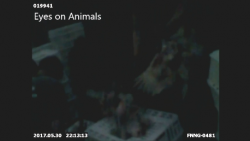 Tonight a team from Eyes on Animals was conducting random inspections of animal transports on the roads in the Netherlands. We spotted two empty Polish poultry trucks heading towards a farm in Drenthe (NL). We followed in order to check on how the hens at the egg farm would be handled during loading before being transported for slaughter in Poland. Birds were held upside down and by one leg, 3-5 per hand of the catchers and literally dropped or stuffed with force into the transport crates. No attention was given to the pain this was causing to the birds as their body parts hit the edges of the crate-doors. The birds were screaming but their noise went unheard by the catchers and even the farmer that was present to help with the loading. The Polish truck drivers admitted that the speed and handling was too rough and rushed.
Tonight a team from Eyes on Animals was conducting random inspections of animal transports on the roads in the Netherlands. We spotted two empty Polish poultry trucks heading towards a farm in Drenthe (NL). We followed in order to check on how the hens at the egg farm would be handled during loading before being transported for slaughter in Poland. Birds were held upside down and by one leg, 3-5 per hand of the catchers and literally dropped or stuffed with force into the transport crates. No attention was given to the pain this was causing to the birds as their body parts hit the edges of the crate-doors. The birds were screaming but their noise went unheard by the catchers and even the farmer that was present to help with the loading. The Polish truck drivers admitted that the speed and handling was too rough and rushed.
We noticed a dead bird in one of the loaded crates already placed on the truck. During loading we also had to alert the catchers several times to pay attention, as they had almost shut the top sliding door of the crate onto the head or wings of some birds.
So far Eyes on Animals has never seen the catching and loading of spent-laying hens go well. The process is always rushed and the birds are always grabbed by their legs and left upside down, with little attention given to the pain and stress this causes them. The entire system needs to be changed. Eyes on Animals now gives welfare-workshops to chicken-catchers and is putting pressure on egg companies to set welfare criteria for the way spent-hens are handled. We have also complained about the hanlding of poultry during catching to the Dutch authorities (nVWA) who are now looking more closely at the injuries caused to the birds.
On the day after this inspection we called the manager of the catching crew and expressed our concern. We suggested he coorperate with us by signing up his catchers to our welfare-workshop, or else we would have to make the name of his business public. Fortunately he agreed to cooperate and a training is planned for late July. We want to, together with the egg industry and the catching crews, make it possible in practice to change the way spent-hens are caught so that suffering is finally reduced.

